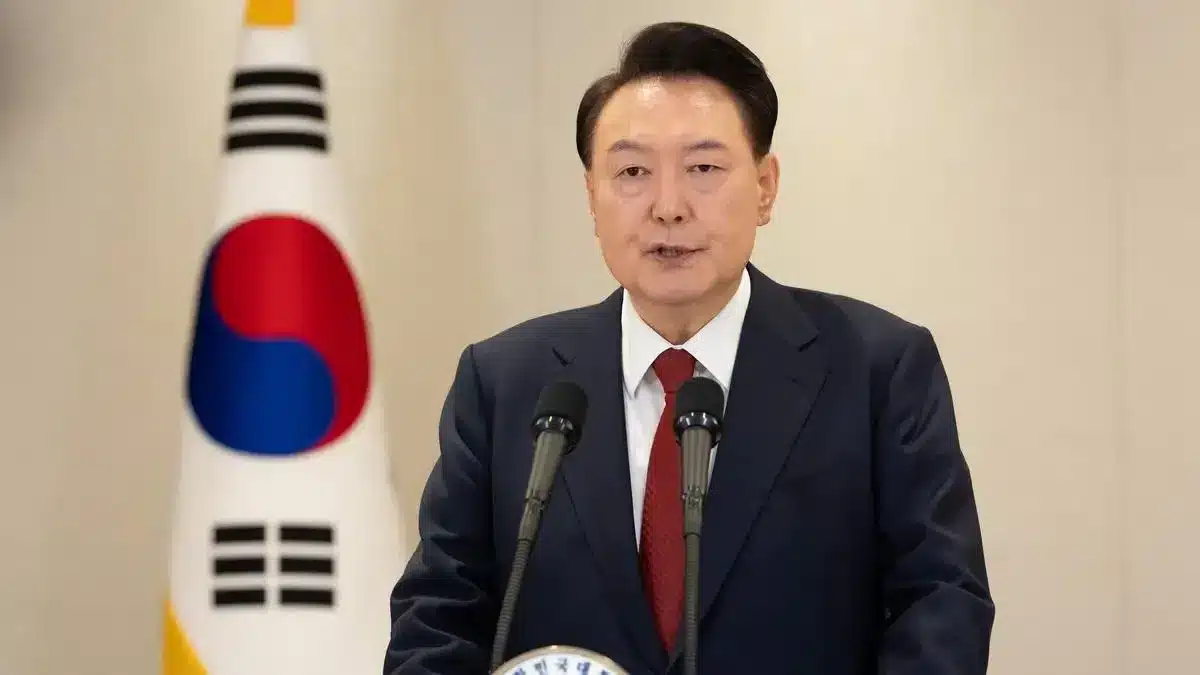What’s in today’s article?
- Why in the News?
- Background of the Incident
- Why Martial Law Was Declared?
- Aftermath
- Impeachment Process
- Significance of the Impeachment
- India’s Stance
- Conclusion
Why in the News?
- South Korean President Yoon Suk Yeol vowed to fight for his political future after he was impeached in a second vote by the opposition-led parliament over his short-lived attempt to impose martial law, a move that had shocked the nation.
Background of the Incident
- South Korean President Yoon Suk Yeol faced growing political unrest and public dissatisfaction during his tenure, primarily driven by his controversial governance style and strained relations with opposition parties.
- Protests erupted across the nation over various issues, including economic downturns, alleged misuse of power, and suppression of civil liberties.
- The immediate trigger for the crisis was Yoon’s declaration of martial law, which followed escalating mass protests and rising tensions with North Korea.
- Critics accused him of using martial law as a pretext to suppress dissent and consolidate power.
Why Martial Law Was Declared?
- The President declared martial law under the pretext of addressing national security concerns, citing escalating unrest and protests against his administration, combined with a politically hostile environment.
- Yoon’s declaration, made abruptly on December 3, 2024, came amid growing opposition to his presidency, low approval ratings due to corruption allegations, and his inability to advance policies in a parliament dominated by rivals.
- Martial law enabled him to deploy the military, suspend civil rights, and limit the powers of parliament and other institutions, ostensibly to restore order.
- This decision was seen as an attempt to suppress dissent, consolidate power, and bypass parliamentary challenges, which had hampered his administration since 2022.
Aftermath
- The move backfired significantly. Public outrage erupted, with massive protests and strikes led by labor unions and citizens calling for Yoon’s resignation.
- The National Assembly swiftly convened to repeal the martial law within six hours, unanimously overturning it, including votes from members of Yoon’s own party.
- Legal and political analysts, as well as opposition lawmakers, labelled the declaration unconstitutional and tantamount to a coup.
- Investigations into the decree have led to the arrest of several high-ranking officials, intensifying calls for Yoon’s impeachment.
Impeachment Process
- South Korea’s National Assembly initiated the impeachment process against Yoon Suk Yeol after securing a majority vote to proceed with the motion.
- The impeachment was based on allegations of abuse of power, violation of constitutional rights, and failure to uphold democratic principles.
- Key steps in the process included:
- Filing of the Motion: The impeachment motion was tabled by opposition lawmakers, citing Yoon’s unconstitutional actions during martial law.
- National Assembly Vote: A two-thirds majority in the National Assembly approved the motion.
- Constitutional Court Review: Following the parliamentary vote, the Constitutional Court began hearings to determine whether the impeachment met the constitutional threshold. After several weeks of deliberation, the court upheld the impeachment decision.
- Yoon Suk Yeol became the third South Korean president to be impeached after Park Geun-hye in 2017.
- In 2004, President Roh Moo-hyun was impeached at parliament over an alleged election law violation but the court later overturned his impeachment and restored his presidential powers.
- Roh jumped to his death in 2009, after he had left office, amid a corruption scandal involving his family.
Significance of the Impeachment
- Strengthening Democratic Norms: The impeachment reinforced South Korea’s commitment to democracy and the rule of law, showcasing the resilience of its constitutional framework.
- Political Realignment: The ruling party faced internal divisions and a decline in public support, leading to major political realignments and possible elections.
- Public Accountability: It sent a strong message that abuse of power and disregard for civil liberties would not be tolerated in a modern democracy.
India’s Stance
- India, as a strategic partner of South Korea, closely monitored the developments.
- While maintaining a neutral position, India emphasized the importance of democratic governance and constitutional processes.
- Diplomatic engagements between the two countries continued unaffected, reflecting India’s focus on long-term economic and security cooperation in the Indo-Pacific region.
Conclusion
- The impeachment of President Yoon Suk Yeol marked a pivotal moment in South Korea’s political history, highlighting the nation’s adherence to democratic principles even amid significant challenges.
- While the process showcased the strength of South Korea’s institutional framework, it also underscored the need for leaders to uphold democratic values to maintain public trust and international credibility.
Q1. What do you mean by Martial Law?
Martial law is the replacement of civilian government by military rule and the suspension of civilian legal processes for military powers. Martial law can continue for a specified amount of time, or indefinitely, and standard civil liberties may be suspended for as long as martial law continues.
Q2. In which article martial law is declared?
In the text of the Constitution of India there is no express mention of ‘martial law’ except in Art. 34 which invests Parliament with the power to indemnify persons in respect of acts done in territories where martial law was in force and to validate acts done under martial law.
Source: South Korea President Yoon Suk Yeol impeached over attempt to impose martial law
Last updated on June, 2025
→ UPSC Notification 2025 was released on 22nd January 2025.
→ UPSC Prelims Result 2025 is out now for the CSE held on 25 May 2025.
→ UPSC Prelims Question Paper 2025 and Unofficial Prelims Answer Key 2025 are available now.
→ UPSC Calendar 2026 is released on 15th May, 2025.
→ The UPSC Vacancy 2025 were released 1129, out of which 979 were for UPSC CSE and remaining 150 are for UPSC IFoS.
→ UPSC Mains 2025 will be conducted on 22nd August 2025.
→ UPSC Prelims 2026 will be conducted on 24th May, 2026 & UPSC Mains 2026 will be conducted on 21st August 2026.
→ The UPSC Selection Process is of 3 stages-Prelims, Mains and Interview.
→ UPSC Result 2024 is released with latest UPSC Marksheet 2024. Check Now!
→ UPSC Toppers List 2024 is released now. Shakti Dubey is UPSC AIR 1 2024 Topper.
→ Also check Best IAS Coaching in Delhi
























